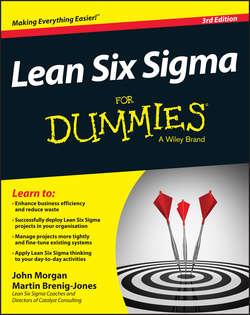Lean Six Sigma For Dummies

Реклама. ООО «ЛитРес», ИНН: 7719571260.
Оглавление
Brenig-Jones Martin. Lean Six Sigma For Dummies
Introduction
About This Book
Foolish Assumptions
Icons Used In This Book
Beyond This Book
Where to Go From Here
Part I. Getting Started with Lean Six Sigma
Chapter 1. Defining Lean Six Sigma
Introducing Lean Thinking
Sussing Six Sigma
Chapter 2. Understanding the Principles of Lean Six Sigma
Considering the Key Principles of Lean Six Sigma
Improving Existing Processes: Introducing DMAIC
Reviewing Your DMAIC Phases
Taking a Pragmatic Approach
Part II. Working with Lean Six Sigma
Chapter 3. Identifying Your Customers
Understanding the Process Basics
Getting a High-Level Picture
Chapter 4. Understanding Your Customers’ Needs
Considering If You Can Kano
Obtaining the Voice of the Customer
Researching the Requirements
Avoiding Bias
Considering Critical To Quality Customer Requirements
Establishing the Real CTQs
Chapter 5. Determining the Chain of Events
Finding Out How the Work Gets Done
Painting a Picture of the Process
Part III. Assessing Performance
Chapter 6. Gathering Information
Managing by Fact
Developing a Data Collection Plan
Introducing Sampling
Chapter 7. Presenting Your Data
Delving into Different Types of Variation
Recognising the Importance of Control Charts
Testing Your Theories
Chapter 8. Analysing What’s Affecting Performance
Unearthing the Usual Suspects
Getting a Balance of Measures
Part IV. Improving the Processes
Chapter 9. Identifying Value-Adding Steps and Waste
Interpreting Value-Added
Looking at the Seven Wastes
Looking Beyond the Seven Wastes
Focusing on the Vital Few
Chapter 10. Discovering the Opportunity for Prevention
Keeping Things Neat and Tidy
Looking at Prevention Tools and Techniques
Profiting from Preventive Maintenance
Avoiding Peaks and Troughs
Chapter 11. Detecting and Tackling Bottlenecks
Applying the Theory of Constraints
Managing the Production Cycle
Looking at Your Layout
Chapter 12. Introducing Design for Six Sigma
Introducing DfSS
Introducing DMADV
Defining What Needs Designing
Considering Quality Function Deployment
Making Decisions
Part V. Deploying Lean Six Sigma
Chapter 13. Leading the Deployment
Looking at the Key Factors for Successful Deployment
Understanding Executive Sponsorship
Considering Size
Introducing the Deployment Programme Manager
Starting Your Lean Six Sigma Programme
Understanding What Project Champions Do
Chapter 14. Selecting the Right Projects
Driving Strategy Deployment with Lean Six Sigma
Generating a List of Candidate Improvement Projects
Working Out Whether Lean Six Sigma Is the Right Approach
Setting Up a DMAIC Project
Chapter 15. Running Rapid Improvement Events
Seeing Rapid Improvement with Kaizen or Kai Sigma Events
Understanding the Facilitator’s Role
Creating a Checklist for Running Successful Events
Chapter 16. Putting It All Together
Working Your Way through DMAIC
Defining Where You’re Going
Getting the Measure of Things
Analysing the Data to Find the Root Cause
Quantifying the Opportunity
Applying Solutions in the Improve Phase
Confirming the Customer and Business Benefits
Implementing, Standardising and Controlling the Solution
Conducting the Final Benefit Review
Chapter 17. Ensuring Everyday Operational Excellence
Making Everyday Operational Excellence a Reality
Clarifying the Role of the Manager
Getting Better Every Day in Every Way
Chapter 18. Comprehending the People Issues
Working Right, Right from the Start
Creating a Vision
Understanding Organisational Culture
Busting Assumptions
Seeing How People Cope with Change
Part VI. The Part of Tens
Chapter 19. Ten Best Practices
Lead and Manage the Programme
Appreciate that Less is More
Build in Prevention
Challenge Your Processes
Go to the Gemba
Manage Your Processes with Lean Six Sigma
Pick the Right Tools for the Job
Tell the Whole Story
Understand the Role of the Champion
Use Strategy to Drive Lean Six Sigma
Chapter 20. Ten Pitfalls to Avoid
Jumping to Solutions
Coming Down with Analysis Paralysis
Falling into Common Project Traps
Stifling the Programme before You’ve Started
Ignoring the Soft Stuff
Getting Complacent
Thinking that You’re Already Doing It
Believing the Myths
Doing the Wrong Things Right
Overtraining
Chapter 21. Ten (Plus One) Places to Go for Help
Your Colleagues
Your Champion
Other Organisations
The Internet
Social Media
Networks and Associations
Conferences
Books
Periodicals
Software
Training and Consultancy Companies
About the Authors
Authors’ Acknowledgments
Take Dummies with you everywhere you go!
Отрывок из книги
Lean Six Sigma provides a rigorous and structured approach to help manage and improve quality and performance, and to solve potentially complex problems. It helps you use the right tools, in the right place and in the right way, not just in improvement but also in your day-to-day management of activities. Lean Six Sigma really is about getting key principles and concepts into the DNA and lifeblood of your organisation so that it becomes a natural part of how you do things.
This book seeks to help managers and team leaders better understand their role and improve organisational efficiency and effectiveness.
.....
In this book you can discover how to create genuine synergy by applying the principles of Lean and Six Sigma together in your day-to-day operations and activities.
In Lean Six Sigma, avoiding the tendency to jump to conclusions and make assumptions about things is crucial. Lean Six Sigma really is about managing by fact. Despite that, we’ve made some assumptions about why you may have bought this book:
.....